Book contents
- Frontmatter
- Contents
- Foreword by Gordon Tullock
- Preface
- 1 Introduction
- 2 The structure of the budgetary process
- 3 Demand in the public sector
- 4 Supply in the public sector
- 5 Political decision-making
- 6 Bureaucratic decision-making
- 7 Institutions
- 8 Ways to reform
- Mathematical appendix
- List of symbols
- Glossary
- Notes
- References
- Index
7 - Institutions
Published online by Cambridge University Press: 20 January 2010
- Frontmatter
- Contents
- Foreword by Gordon Tullock
- Preface
- 1 Introduction
- 2 The structure of the budgetary process
- 3 Demand in the public sector
- 4 Supply in the public sector
- 5 Political decision-making
- 6 Bureaucratic decision-making
- 7 Institutions
- 8 Ways to reform
- Mathematical appendix
- List of symbols
- Glossary
- Notes
- References
- Index
Summary
Agenda rules
In chapter 6 it appeared that bureaucratic supply induced a good deal of stability in the model of the budgetary game as it was presented in the opening section. As far as public goods are concerned, the model is able, in principle, to explain stability, provided that bureaucratic price discrimination is possible.
The stability question remains to be answered for the cases in which bureaucratic supply does not induce stability. This is the purpose of the present chapter. One must then think of services with unevenly distributed benefits such as minority private and group goods, and of public goods in situations where price discrimination is not possible.
In the initial analysis of political decision-making, it was mentioned that budgetary games generally lack cores or other stable solutions, so that attention has to be focused on the institutions of the budgetary process. Institutions are, of course, not an invention of economic theory. Indeed, the importance of rules that lead to the selection of a small group of ‘feasible’ proposals before any political decision-making in the proper sense starts, has since long been recognized in the organizational process branch of budgetary theory: recall, for instance, the notion of ‘taking the base for granted’ as a major ingredient of the organizational process perspective on budgetary decision-making. In this light, the recent upswing of interest in the institutional aspects of collective decision-making among economists can be interpreted as a late recognition that the organizational process theorists have been looking at the crucial factors all along. However, this interpretation must be qualified in two respects.
- Type
- Chapter
- Information
- Budgetary DecisionsA Public Choice Approach, pp. 157 - 189Publisher: Cambridge University PressPrint publication year: 1996

